|
|
| 'Like' us on Facebook | Follow us: |
Posted on: Nov 12, 2016
“Mujhe Darsha Dhikao Bhagawan...”
A conversation with Sai alumnus Ajnish Rai on how bhajan singing
can grant us the vision of the Inner Self and lead us to immortality.
As we participate in the 24-hour Global Akhanda Bhajan (November 12-13, 2016), let us make most of this beautiful window of opportunity granted by the Divine to cleanse ourselves.
What Do We Pray for in Mujhe Darsha Dikhao...
Bishu Prusty (BP): Mujhe Darsha Dikhao Bhagawan is such a powerful bhajan. I know you have sung this many times in the Divine Physical Presence. What thoughts come to your mind whenever you offer this bhajan to Bhagawan?
Ajnish Rai (AR): This is of the more serious and intense type of bhajan filled with bhakti bhava (the feeling of devotion). It is based on the Hindustani raga ‘Darbari’ which is a very deep raga filled with what we call ‘Gambhir bhava’. This raga was supposed to have been invented by Tansen during the Mughal period.
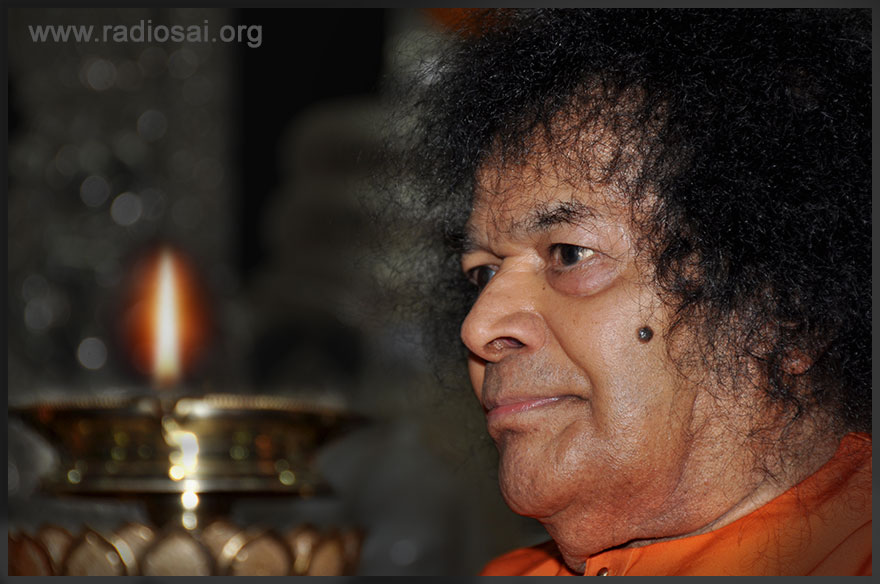 |
This bhajan is a prayer asking Bhagawan to give us a vision of Himself. We are pleading with Him to give us a vision in life and show us the direction for a spiritual life. We are entreating Bhagawan to tell us something because often engaged in our day-to-day mundane life we tend to get lost; we tend to be in split mind as to what to do or not do.
BP: “Darsha Dikhao” means not only “Give me Your darshan but give me the vision so that I can envision You. Show me a path because now I am at a crossroad. Tell me what I should do next.”
AR: Yes. That is what I feel. Whenever we see Swami, we see our true Self. Asking Swami for a vision is asking for a vision of our true Self which is a realisation of what we really are. This is a deep song filled with pathos. Let me sing a little and try to explain through bhava rather than just by words.
The first part of the bhajan dwells on the lower notes.
Just a mere plea won't appease Bhagawan. So we have to intensify the bhava after the first line.
Still I don't get any answer. Why? Because my prayer is not intense enough. So we have to take the prayer deep into our hearts. We have to turn on the third and fourth gears.
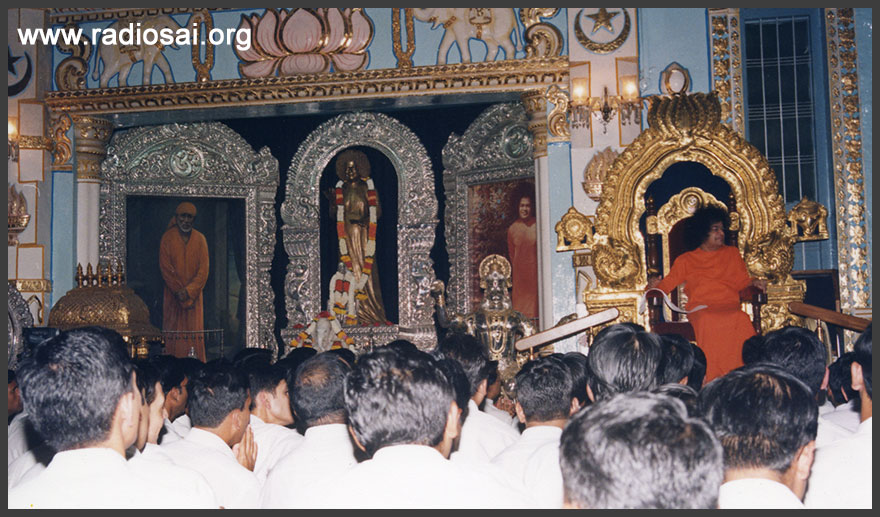 |
“Swami, You are the all-knowing, omniscient Lord. You know everything. You even know what I am going to ask even before me asking.”
“You are the indweller. Without me asking, without me crying, You know everything.”
‘Atmaram’ is the indwelling deity. We are saying, “Lord, You are actually my Self.”
This is the rise and the fall. Every bhajan has to go up to a high pitch and then land peacefully.
BP: Beautiful. So this bhajan is all about asking Bhagawan for the vision for our true Self. It is so clear because here we are saying “Tumho Mere Atmaram Baba”. Even if we see from the composer's point of view, it is obvious that right from the start of this bhajan we are not praying for just the Lord to come and manifest in front of us but we are addressing our true inner Self (Atma Rama).
Finally we say, “Give us that Amritvani or Your immortal message. We want that guidance from You.” The Lord is the indweller and there is no need for us to ask anything because He knows our problems. We pray, “All I want is a message. I clearly know that You are not outside. You are very much inside. You know what my heart longs for. Give me that direction please.”
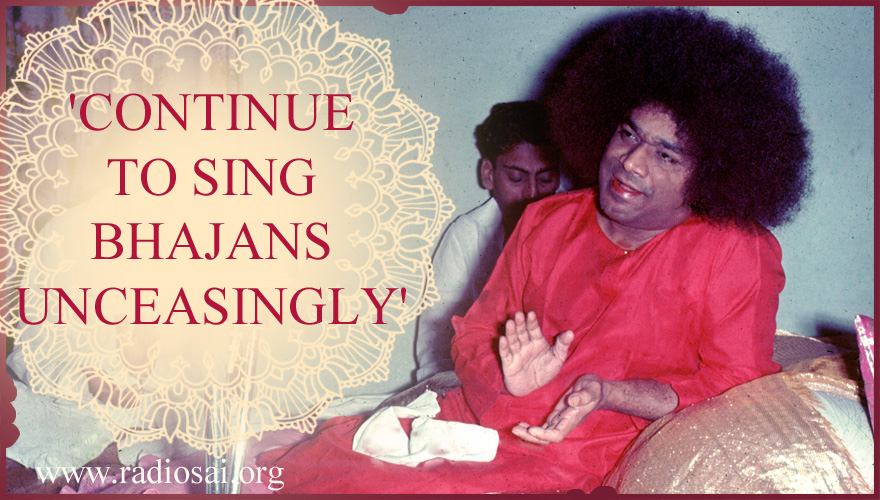 |
Bhajans – A Beautiful Tool for Personal Emancipation
AR: True. This bhajan is very intense. When you are not singing in a congregation, you can just go on for hours singing line after line picking up a few variations but of course, when you are singing in the mandir, for everyone to follow you have to simplify. You have to cut short the turns and twists. But when you sing alone it can take you on a spiritual journey. For example -
This is a beautiful line. It is like telling, “Bhagawan, You know everything but why don't You give me what I seek?” It is a friendly conversation but you are also desperate that you want that vision and wisdom. Then you shout out -
The tune is the same but you can intensify the bhava.
You can play around with the bhava not for the sake of vocal gymnastics but for the feeling.
These are some things which make bhajan singing a very personal experience. It is just between you and your Lord. I do not believe in doing too many vocal gymnastics. But if you know the raga properly and if you have done your vocal practice well, you can concentrate on the feeling more. You should do your practise, and training of your vocal chords at home. Having done this, when you offer it to Bhagawan in a public bhajan session, you can concentrate fully on your bhava. Then it becomes a purifying experience.
BP: Once you have done your homework well in terms of learning the raga, doing your voice culture and practising the technicalities of the bhajan, you will not be in any way incapacitated in expressing the bhava of the bhajan. You will automatically sing without any difficulty.
AR: Correct. You don't have to use your mind and think “I am going to do this turn here, that twist there, and so on”.
BP: Your attention is only on communicating with the Lord. The other beautiful thing you mentioned is that bhajan singing is a personal sadhana for you. Bhajan singing can really take you to the goal because every bhajan is so pregnant with meaning and bhava. Bhajans are not meant only for community singing. Yes, when you are doing community singing, you have to follow the pattern and the rules but when you are alone you can use it for your own personal sadhana.
When Bhagawan started His mission, He sang, “Manasa Bhajare Guru Charanam, Dustara Bhava Sagara Taranam”. He said that bhajans will take us across this ocean of the cycle of birth and death. So all we have to do is just take one bhajan and keep ruminating over it. That will become such a powerful sadhana and will ultimately liberate us.
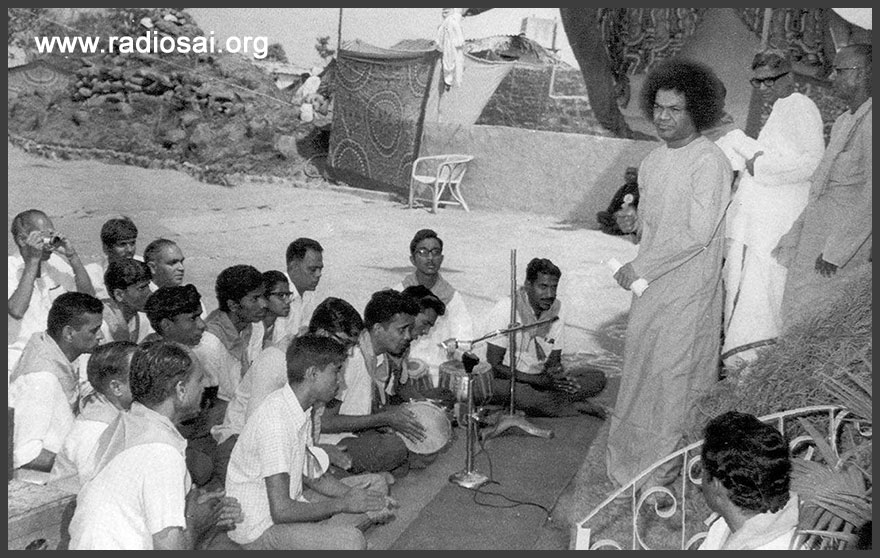 |
Bhajan Yoga is Prema Yoga
AR: Absolutely! Bhagawan started His mission with this bhajan. After that Puttaparthi could have had so many yoga classes and pranayama classes going on. In His 85 years, He could have easily created so many Ayurvedic colleges and other things here. But when God Himself is physically present you don't need all these diversions. When the final goal is before you, why go into all these other routes? He has told, “Sing the name of the Lord with love. That is enough.”
BP: He made it so beautiful and easy. As you rightly mentioned, He could have created so many institutions teaching things like Kriya Yoga, Hatha Yoga, etc. if He wanted. In fact in a discourse, very beautifully He said, “I do not recommend any of these Yogas. The only Yoga I recommend is ‘Prema Yoga’.”
I think bhajans are the most apt and most delightful medium to practice ‘Prema Yoga’ because you can just sing a bhajan and become lost in love for the Lord. You can have your own moments of becoming a Tyagaraja or Meera. During those moments you become a saint because you are so much lost in the bhava.
AR: Yes. Bhagawan has given us the greatest of yogas which is bhajans and He Himself has sat down and taught us how to sing. He did correct me so often.
BP: Can you mention one or two such interactions with Bhagawan?
AR: My first bhajan before Bhagawan was “Jaya Jaya Krishna Yadunandana”. My mother tongue being Nepali, I had problem pronouncing Hindi words. The following day, Bhagawan called the whole music group inside the interview room. He asked me, “Yesterday what did you sing?” and I sang “Jaya Jaya Kree…..shna Yadunandana”.
Immediately Bhagawan stopped and said, “It is not Kree…shna but Krishna. It is not badaa ree (long ree) but chota ri (short ri). If you pronounce wrongly, the meaning changes.”
I argued with Bhagawan saying, “When I sing, it does not fit in the metre.” Swami said, “Why doesn't it fit? You sing it once.”
Then He started tapping His hand to beat and made me sing. I sang “Jaya Jaya Krishna Yadunandana” and immediately it sounded beautiful.
That was my first lesson in pronunciation.
Later on when I took up singing professionally, I went to Bombay University to learn Urdu for Ghazal singing. Bhagawan's guidance on proper pronunciation made me take it up very seriously because in Urdu the words are even harder to pronounce. His instructions helped me a long way to take up singing professionally. That is how Bhagawan prepares us.
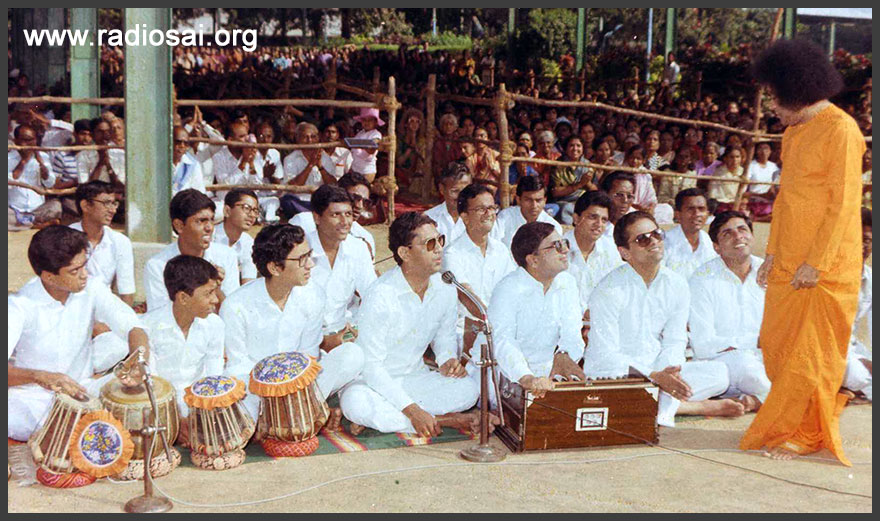 |
BP: When we started this conversation, you mentioned about Tansen and that he is supposed to have composed the raga Darbari. I remember, in one of the dramas that was staged in Bhagawan's physical presence, you were Tansen. The song you sang was also in this raga.
AR: Right. That was in Darbari. That was composed by our revered teacher Dr. Shailesh Srivastava and he had exactly done Tansen's composition in raga Darbari. It was very difficult to sing because at that time I was not familiar with ragas but of course, by the guidance of Shailesh Sir, many elders and Swami Himself I was able to do it. Swami directed on how Tansen should look and how he should wear rings in all ten fingers, and so on.
BP: The message in that scene of Tansen and Haridas was so powerful. Tansen is singing for name and fame and Haridas, his Guru, is singing for the Lord.
AR: Tansen tells the king, “I am singing for what you are going to reward me but my guru is singing for what he has already been rewarded with.”
BP: Wow! That is again a message for all of us who sing bhajans.
To Be Able to Sing is To Be Grateful Multifold
AR: Yes. The first thing I always feel is to be grateful for being able to sing. To get this life we should be grateful. To get this life and to be happy in this life, we have to be even more grateful. To be happy and to be singing after getting this life, imagine the bounty that the Lord has bestowed upon us! Very rarely will you find people being able to sing joyfully and happily.
BP: Your life has become a song!
AR: Yes.
BP: You never imagined that you will take up professional singing when you joined Bhagawan's University.
AR: No, but it was music that dragged me to Swami's feet.
BP: It is still music which always keeps you connected to Swami wherever you are.
AR: Absolutely.
BP: Music has taken you to so many places including Sai centres.
AR: Yes and it is always so blissful. Swami has given such a great blessing to not only me but every bhajan singer. All that we have to do is continuous singing and be happy and grateful. That's it. I am sure the prayer in “Mujhe Darsha Dikhao” will be fulfilled.
BP: He will grant us that vision.
AR: Definitely. It is already there. It is just that we have to clear our own fogs.
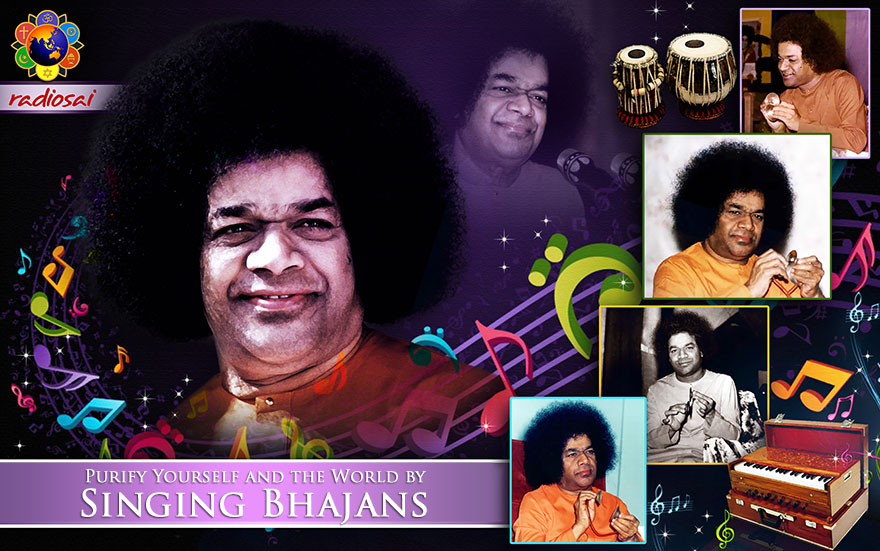 |
BP: We just have to uncover whatever is clouding our vision. Each bhajan is only helping us cleanse our inner Self and listen to that voice - the Amritvani. That word is so beautiful because it denotes the immortal message. We are telling, “Lord, I don't want anything temporary. I want the immortal message.” Every bhajan will lead us to the immortal vision and message of the Lord. Beautiful! Thank you very much brother.
AR: Thank you for this opportunity. I hope I get more such opportunities to derive such joy from being in such a satsang. Sairam.
− Radio Sai Team
| comments powered by Disqus |






